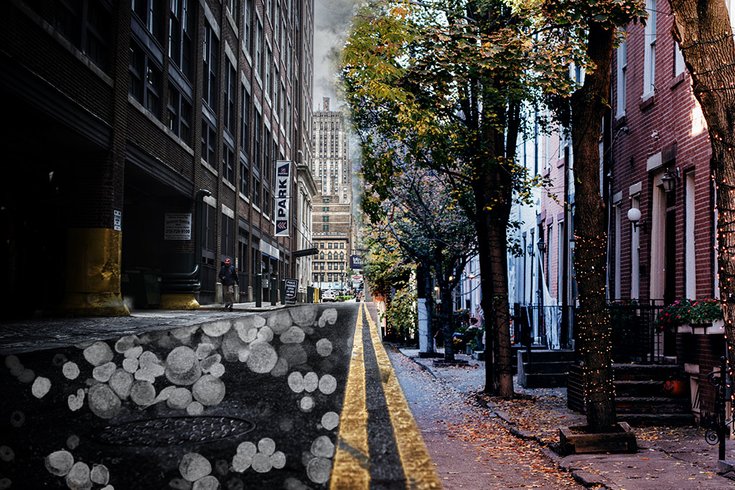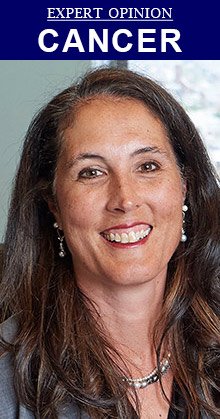
January 16, 2019
 PhillyVoice illustration/Images by Edan Cohen and Jacob Culp on Unsplash, and KGH via Wikimedia
PhillyVoice illustration/Images by Edan Cohen and Jacob Culp on Unsplash, and KGH via Wikimedia
Philadelphia is tops the nation in what’s known as the “zip code gap” – when certain groups may bear a disproportionate burden of cancer compared with other groups. The city has the greatest disparity in mortality, especially from cancer, for vulnerable populations.
It is a pivotal moment in the fight against cancer. Treatments unthinkable just a few short decades ago, such as immunotherapy, are now saving lives and we are continually improving ways to, prevent, detect and manage cancer. And right here in Philadelphia, we’re ready for a new blueprint to address our city’s unacceptable cancer disparities.
National progress against cancer is undeniable and as a result, the overall cancer death rate in the United States has been steadily decreasing. It is our mission, and indeed our obligation as cancer researchers and cancer care practitioners, to ensure that everyone benefits from these groundbreaking advances; however, some populations, including racial and ethnic minorities, people of a lower socioeconomic status, members of the LGBT community, people who are under- or uninsured, immigrants, and people who live in certain geographical areas are shouldering a disproportionate cancer burden.
Philadelphia, the nation’s sixth-largest city, tops the nation in what’s known as the “zip code gap.” For example, there is a difference of 20 years in longevity between the zip codes of the neighborhoods of Society Hill and Strawberry Mansion. Philadelphia is America's poorest major city, has one of the highest obesity rates among large cities, and has the greatest disparity in mortality, especially from cancer, for vulnerable populations. This translates into an unfortunate daily story — older, poorer Philadelphians presenting for emergency care with advanced cancers that are more difficult to treat.
Karen E. Knudsen, Ph.D., is the enterprise director of the Sidney Kimmel Cancer Center – Jefferson Health.
Philadelphia’s racially and ethnically diverse population face higher cancer incidence and mortality rates. For example, African-American men die from prostate cancer at a rate more than double that of men of any other race or ethnicity, African-American and Hispanic women are much more likely to be diagnosed with advanced stage breast cancer compared with white women, and Asian and Pacific Islanders face high rates of hepatitis B infection and liver cancer.
Cancer disparities are associated with multiple factors, including unequal access to care and biological differences in tumors that may affect prognosis and treatment, so we need a multi-pronged strategy.
So what is the playbook for reducing cancer disparities? First and foremost comes community outreach. At the Sidney Kimmel Cancer Center at Jefferson (SKCC), we work closely with community physicians and local organizations within neighborhoods experiencing unacceptable rates of cancer and mortality. Community outreach includes organizing multi-language information sessions about cancer prevention and working with church parishes to host screening events.
The second tactic is to improve access. Increasing access to cancer screening and care is essential so we opened our chemotherapy infusion center on nights and weekends and offer mammograms during evening and weekend hours, which has increased uptake, and as our health system expands we are able to bring care closer to a greater number of people throughout Greater Philadelphia.
A third key to reducing disparities is through clinical trials, which are one of the best tools we have for improving health and finding new and better ways of treating disease, and may offer patients novel therapies that may not be widely available yet. Because clinical trials help us determine which treatments work best for which people, we need diverse representation involving people of all races, ages, ethnic groups and genders, yet fewer than 10 percent of cancer patients enrolled in clinical trials nationwide are minorities.
We work with community physicians so that they can provide information on cancer clinical trials to their patients, and have placed advanced care hubs with clinical trials in the community setting. SKCC is proud to have achieved one of the highest clinical trial enrollment rates in the nation, wherein patients of all demographics partake of these advanced care options.
Finally, we now know that small differences in genetics can make large differences in cancer treatment outcomes so we expanded our genetic testing with the first men’s genetic risk initiative, which serves to identify Philadelphians most at risk for developing aggressive prostate cancer and to develop appropriate screening plans. We identified the genetic basis of disparity for matching leukemia patients across diverse populations to bone marrow donors, and translated these findings into novel treatment strategies for this population.
When it comes to improving health outcomes in Philadelphia and beyond, it does indeed take the whole village. SKCC works closely with local, national and federal health agencies, nonprofit organizations, and other cancer centers and universities. Our population scientists are researching ways to better identify and understand barriers to care in underserved communities and develop strategies to provide better care, while clinical and laboratory scientists are uncovering differences in the genetic code to develop personalized screening and treatment options.
As Philadelphia grows and brings with it new cancer challenges, our goal is to break down the zip code barrier and ensure everyone can access the best care available. That's the vision for tomorrow’s Philadelphia history — a new revolution in ending disparities in cancer mortality.
Karen E. Knudsen, Ph.D., enterprise director at the Sidney Kimmel Cancer Center – Jefferson Health, oversees cancer care and cancer research at all SKCC sites in the Greater Philadelphia region. She writes occasionally on topics related to cancer.
